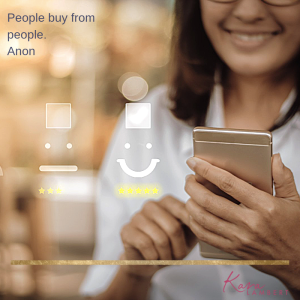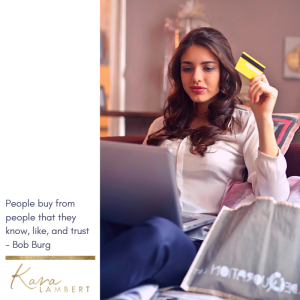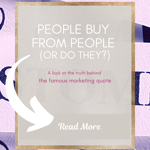Ever heard the saying, “people buy from people”? It does its rounds, especially with social media marketing types. But have you ever stopped to think more about it, what it means, if there’s any truth behind it, and how you could actually make any use of it.
What does ‘people buy from people’ mean?
Depending on who you talk to, people buy from people has a variety of meanings:
- Be vulnerable
- Be authentic
- Do video
- Make sure your marketing meets your clients where they are
- Post more photos of yourself
- Solve your client’s problems
- Be honest
- Be credible
Take from it what you will, it comes down to being real because customers can smell BS a mile off!
Where does the saying ‘people buy from people’ come from?
People buy from people is a cut-down version of the Bob Burg quote, “People buy from people that they know, like, and trust”. The quote comes from his 1993 book Endless Referrals.
Many others have said similar things.
Zig Ziglar said, “If people like you they’ll listen to you, but if they trust you they’ll do business with you.”
Seth Godin said, “People do not buy goods & services. They buy relations, stories & magic.”
Simon Sinek said, “People don’t buy what you do; they buy why you do it. And what you do simply proves what you believe.”
The shortened version has become more popular in recent years, especially with social media marketing increasing and marketers looking for a way to differentiate their social media marketing services. The irony is that what they are selling as a “new way of marketing” or their ‘revelation’ is nothing new. The local butcher, baker, publican, corner store owner knew this.
If you just want to skip to the solution, access this free course that explains the most common social media errors businesses make and psychology solves.
Is there any truth to the saying ‘people buy from people’?
Like anything, there’s a modicum of truth and considerations to be taken. Do we really need to know, like, and/or trust someone/brand before we buy from them? Is that all we need?
before we buy from them? Is that all we need?
The short answer is, no.
We don’t always buy from people because they are human, likeable, known to us, or trustworthy. We buy food because it’s a necessity. We buy clothes because it makes us feel good. We buy a car because of status. We buy a holiday for an experience. We choose a seller because they help us achieve these things.
Then when you consider the big end of town, global brands, and the faceless conglomerate; people buy from them and they don’t have a personal brand, brand ambassador, or the founder/CEO doesn’t actively post their latest adventures on social media.
But before you think that all those who say this and its variations are on some sort of bandwagon and have been hoodwinked, I want to share some science that actually proves the quotes right – bit by bit.
What about known?
In their research “The Impact of Branding on Consumer Buying Behavior”, Sarwar, Aftab, & Iqbal found that “brand knowledge has a great impact on consumer behavior” and that “that more the consumer is aware of brand knowledge, more he will be responsive to the brand and he will buy that same branded product again and again”. They also showed that a lack of brand knowledge impacts buying behaviour, “there is a positive correlation and cause and effect relationship among brand knowledge and Consumer buying behavior. Consumer buying behavior will increase or decrease with brand knowledge”.
So it seems that the better known a brand is to a person, the more likely they are to buy from them and keep buying from them. Ie. People buy from people they know
What about like?
Verhagen & van Dolen (2011) found that “Consumer behaviour is likely to be dominated by positive emotions and less by negative emotions”.
Mazaheri et al. (2011) found in their research of Canadians that customer attitudes on the site positively (and significantly) influenced their service attitudes and that service attitudes influenced buying intention. They also found that the perceived entertainment value of the site positively influenced customer attitudes. Varhagen & van Dolen (2011), took this intention one step further showing that positive intention leads to actual purchases.
So it seems that if a customer thinks positively about a business then they are more likely to buy from a business. So, people buy from people that they like or are likeable.
What about trusted?
Current research shows that trust can be transferred between brands, where trust was found or developed (offline to online and vice versa) so long as there is some context between them. Oprah’s Bookclub is a good example; people trust Oprah, so they trust her book club recommendations.
versa) so long as there is some context between them. Oprah’s Bookclub is a good example; people trust Oprah, so they trust her book club recommendations.
Nosi et al. summarises the impact of trust on customers as: ” Trust underlies several elements that relate to consumers, such as brand loyalty, attachment, engagement, brand extension acceptance, customer satisfaction, and buying intent”.
John (2019) found that there was a link between levels of online trust that a client had and their online buying behaviour.
These and other pieces of research show that “People buy from people that they trust”.
So while we don’t necessarily have to know, like and trust someone to buy from them – it certainly helps in situations.
How can businesses use ‘people buy from people’?
There is no magic formula to have people buying from you using the quote of “people buy from people” as a formula. We are all different. Sarwar et al. (2014) even noted that culture and values impact customer buying behaviour.
In the main, businesses will benefit from understanding their clients’ culture, values, needs, fears, goals, and other influencers of trust and likeability. Using this information to fuel their social media, communication, and offline activities will help build the relationship and connection which will drive purchases.
If you would like to learn more about these underlying behaviours I recommend:
What is the psychology behind staff and customers drivers (neuromarketing)
How to understand the psychology of your audience
Write engaging content customers want to respond to
This free video course on the common social media errors psychology solves
References
John, S. (2019). A Study on the Impact of Online Brand Trust and Sales Promotion as Competitive Strategies in Online Buying Decisions by the Consumers.
Mazaheri, E., Richard, M. O., & Laroche, M. (2011). Online consumer behavior: Comparing Canadian and Chinese website visitors. Journal of Business Research, 64(9), 958-965.
Nosi, C., Pucci, T., Melanthiou, Y., & Zanni, L. (2021). The influence of online and offline brand trust on consumer buying intention. EuroMed Journal of Business.
Sarwar, F., Aftab, M., & Iqbal, M. T. (2014). The Impact of Branding on Consumer Buying Behavior. International Journal of Technology and Research, 2(2), 54.
Verhagen, T., & Van Dolen, W. (2011). The influence of online store beliefs on consumer online impulse buying: A model and empirical application. Information & Management, 48(8), 320-327.



[…] said they’d bought a holiday home in Devon and were coming for their furniture. (This is why people buy DFS […]
[…] "People buy from people they know, like, and trust" […]